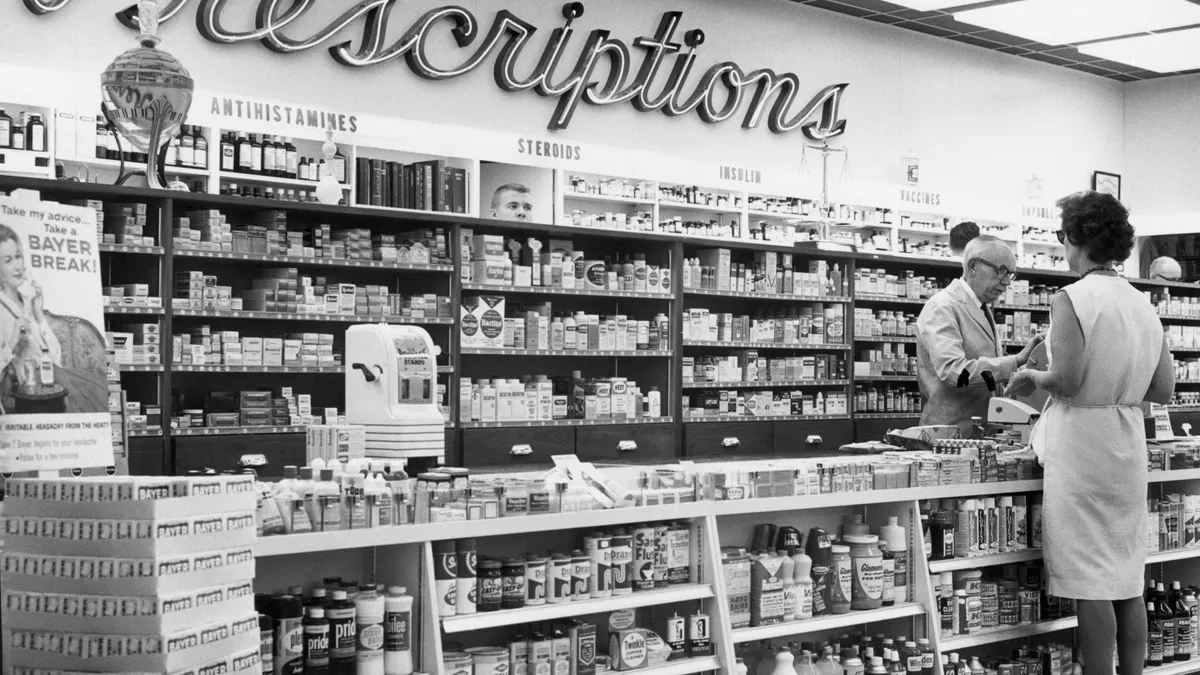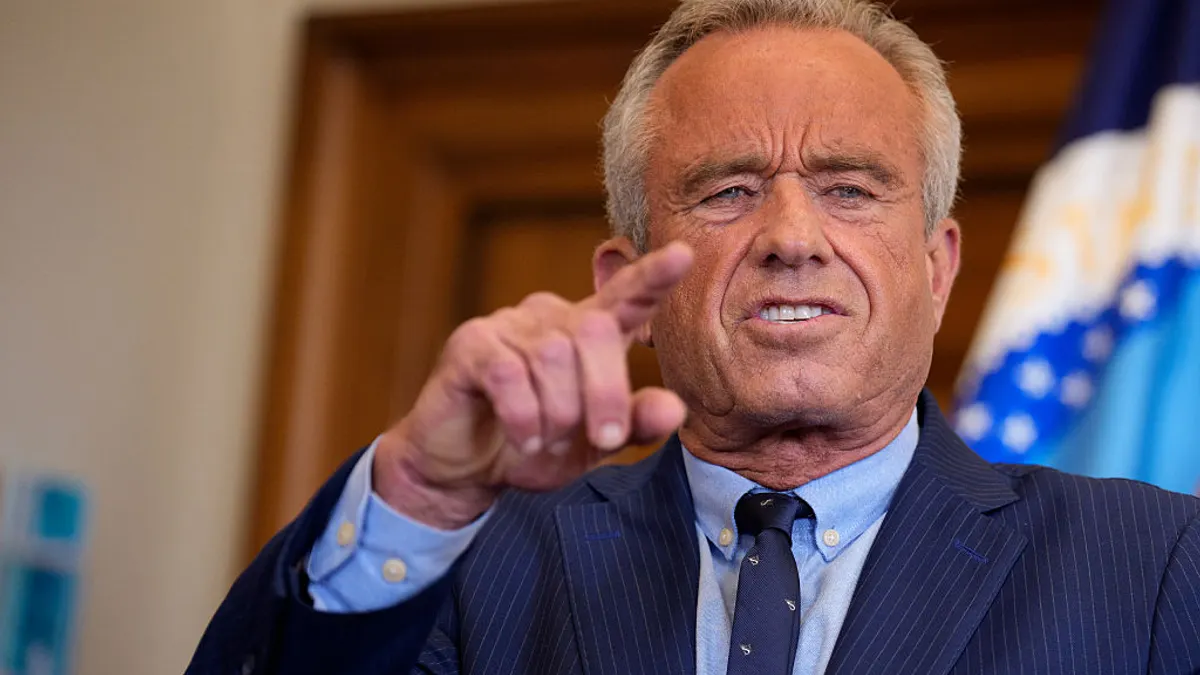The pharmacy benefit management system is complicated. Just ask Shelly Sanchez of Elixir, a PBM owned by the Rite Aid Corporation.
"PBMs started really as claims processing," Sanchez, who is Elixir's vice president of strategic solutions, says. "When people ask me, what on earth do you do? That's always a tough question to answer."
The reality is that PBMs do a lot more than negotiate prescription drug costs and process prescriptions. But they've gained a reputation as the purveyors of rising drug costs in the U.S., according to drugmakers and lawmakers who often point fingers at a lack of transparency within the industry's inner workings.
To curb drug costs, U.S. Sens. Maria Cantwell (D-Wash.) and Chuck Grassley (D-Iowa) introduced a bill this week called the Pharmacy Benefit Manager Transparency Act of 2022 to "empower the Federal Trade Commission and state attorneys general to stop unfair and deceptive PBM business practices."
These lawmakers, as well as pharma companies and the Pharmaceutical Research and Manufacturers of America (PhRMA) trade group often place blame on PBMs for charging more for prescription drugs and profiting as "middlemen" in the process. And PBMs do in fact make a profit by facilitating and negotiating prices for drugs as they manage those medication benefits.
Lack of sunlight
One of the main issues is that much of what a PBM does happens in the shadows, U.S. Sen. Rick Blumenthal (D-Conn.) said in a May 5 Senate hearing on prescription drug prices.
"PBMs will argue that rebates lower the cost of your insurance, but truly we have no idea whether this is accurate because PBMs shroud this information in secrecy," Blumenthal said. "If these rebates are lowering the cost of healthcare, that's news to patients — insurance premiums and deductibles have not gone down and instead increasingly they are eating into Americans' hard-earned dollars and savings."
PBMs paint themselves as a line of defense between consumers and high drug costs set by the pharma companies.
"The consumer is benefiting," said JC Scott, president and CEO of the PBM trade group Pharmaceutical Care Management Association (PCMA), at the hearing. "The cost of the drug itself is too expensive — that is a fundamental starting point that I think we can all agree on."
The CEO of Cigna, David Cordani, which operates Express Scripts as one of the largest PBMs in the U.S., said in January that the blame does not fall on them.
"I believe very passionately that pharmacy benefit managers and the legacy of those have created a lot of value from a societal standpoint," Cordani told Yahoo Finance. "Access to care, care coordination programs, the movement from brand to generic was led by the PBMs long before Cigna and Express Scripts came together."
Changing with the times
As drugs become more complex and specialized, the services that PBMs provide go deeper than just negotiating price, Sanchez says.
"Another term we've often used is a ‘healthcare connector’ — by the nature of that, yes, we are sort of in the middle of the process, but we're doing that because we're connecting the pharmaceutical manufacturer relationships," Sanchez says. "We're connecting the plan sponsors with the members themselves, oftentimes."
And because of the vastly complex healthcare system in the U.S., Sanchez says legislation needs to be informed by all of the stakeholders that make up the network that ultimately delivers drugs to patients.
"The biggest change in healthcare tends to come from D.C., but I always think about having it come from all different angles," she says. "All of the stakeholders in this complex healthcare system have members voicing how it actually affects them when the price of the drug is egregious."
"So as drug treatments have evolved, the management of patients with these conditions has evolved exponentially, and specialty pharmacies have had to evolve with that level of care."

Jordan Maddocks
Director of clinical outcomes and services at Elixir Pharmacy
While PBMs find themselves under fire from many directions at once, they argue that for patients, they’re the glue that holds the healthcare system together.
Where PBMs particularly become important is in the specialty pharma space, bringing cutting-edge drugs to patients with rare and serious conditions, Sanchez says.
The healthcare landscape has changed drastically as innovation allows for pinnacles of medical achievement that were unheard of prior to the turn of the millennium, says Jordan Maddocks, director of clinical outcomes and services at Elixir Pharmacy, the specialty medicine branch of the company.
"From a specialty pharmacy perspective, if you look at the landscape for an area like oncology, 30 years ago it was pretty much straight chemo — there weren't many treatment options," Maddocks says. "So as drug treatments have evolved, the management of patients with these conditions has evolved exponentially, and specialty pharmacies have had to evolve with that level of care."
Elixir was recently among just 13 pharmacies nationwide selected to distribute Lenvima, a kinase inhibitor pill to treat thyroid, kidney, liver and endometrial cancers. The drug was developed by Japan's Eisai.
PBMs like Elixir work closely with both manufacturers and physicians to ensure the correct use of the drug, particularly with regimens as strict and risky as those for cancer.
"For a product like Lenvima that treats several types of cancer, it's a very high need but it also comes with a lot of potential toxicity and safety concerns, and so we need to be able to work with patients and prescribers and other healthcare providers and preventing and proactively addressing those risks and concerns," Maddocks says.
What PBMs are tasked to do, he says, is help patients navigate a system with many checks and balances to ensure the best outcomes while avoiding some of the pitfalls that can occur with these types of drugs. Often, those discussions take place at the very beginning of a drug's development life cycle.
"It starts 10 to 15 years before a drug even gets launched. Industry experts will do the research and development of these novel agents, which ultimately treat conditions that are a lot of times terminal in the case here with oncology," Maddocks says.
And while price is part of negotiations, there are many other factors to consider at that time, he added.
"Through that whole process of navigating the FDA approval and review landscape, prior to when a product is approved and launched, we will engage that industry partner, the manufacturer, and start having discussions about the distribution of that product — each product is unique with its safety profile, handling, storage and other considerations," Maddocks says.
The price shadow
While PBMs are knee-deep in these issues around operational ability to distribute drugs, price does still come into play, particularly as another potential barrier to care.
Sanchez says that Elixir's model is one of the more transparent around pricing and rebates "compared to the bigger players." As stated in the Cantwell-Grassley bill in the Senate, three PBMs make up nearly 80% of the prescription drug market —CVS Caremark, Cigna and OptumRx (UnitedHealth) — and the bill says they "operate with little oversight by federal regulators and out of the view of consumers."
At the small-by-PBM-standards Elixir, Maddocks says their clinicians can still have a good amount of contact with patients and consumers, and are nimble in terms of getting them the prescriptions they need.
"We talk with customers every day and we always hear this struggle with the costs of the drug and out-of-pockets and deductibles," Maddocks says. "We're able to take those concerns and those struggles that could lead to a patient never starting a treatment, and we voice those back to our partners and say, 'Look, here's what we're seeing.'"
That can lead to copay assistance, patient assistance programs, bridge programs and other ways to lower prices for individual patients.
"We utilize our industry partners in those situations to make sure that [the] patient isn't being turned away purely for a financial reason," Maddocks says. "We do voice that back, and take the comments and the voice of the patient and project that out and find solutions, either through the industry partner or nonprofits or foundations that may be able to help."
At the negotiating table, PBMs also have tools to combat unrealistically high list prices, Sanchez says.
"We can certainly give feedback when we get it — I don't know how much influence we have on the manufacturers realistically on the list price that they're coming with," Sanchez says. "From a formulary rebates perspective, if we think the drug is absolutely overpriced, we've got some tools in our back pocket in terms of formulary decisions and rebate discussions with the manufacturers to express our opinion if we really did think the price is too high."
The Cantwell-Grassley bill would address some of these issues, as well, by prohibiting "unfair or deceptive pricing practices" and incentivizing or mandating transparency.
But if legislation is the way to fix the broken healthcare system, it must happen instead at the pharmaceutical level, the PCMA trade group's Scott said at the May 5 hearing.
"We have to address the underlying cost of the drug that's set by the manufacturer because otherwise it's a series of tradeoffs, and one way or the other, the consumer pays depending on the plan sponsor's design," Scott argued.
Blumenthal shot back: "I think you just described the problem: One way or the other, the consumer pays."





















